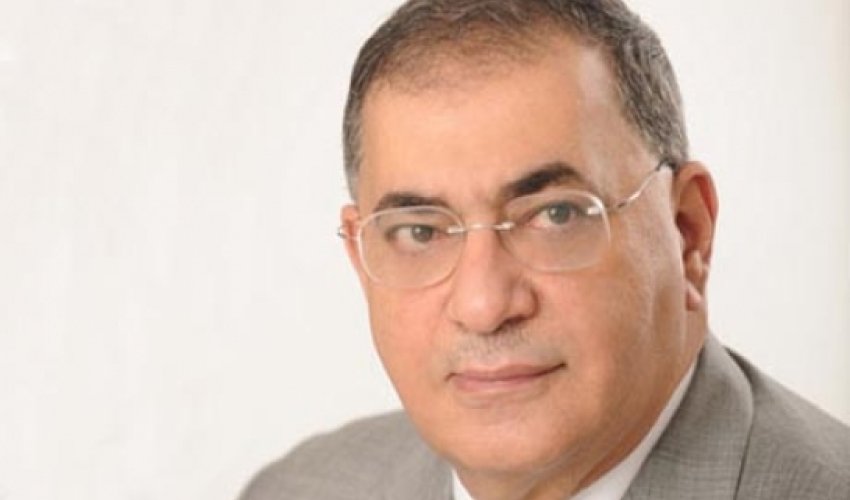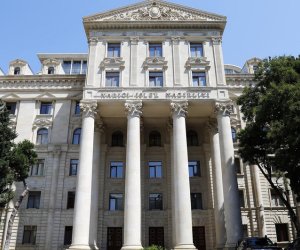Mollazade: Azerbaijan ready to contribute to IMF-led Ukraine bailout

Ukraine’s central bank reversed the hryvnia’s slide with capital controls, giving authorities a reprieve as they struggle with a deepening economic crisis amid a political stalemate stretching into its third month.
Limits on foreign-currency transactions boosted the hryvnia the most in more than four years yesterday. The Natsionalnyi Bank Ukrainy in Kiev said the measures will be temporary. Fitch Ratings downgraded the country’s foreign-currency debt to below Greece, citing a worsening financing outlook, while Ukraine’s reserves dropped to the lowest level since May 2006.
Ukrainian authorities are grappling to stabilize the economy, rocked by a political crisis that has crippled the country’s ability to raise funds. President Viktor Yanukovych traveled for the start of the Winter Olympics to Russia, which has halted payments of a $15 billion bailout after protests in Kiev and around the nation led to the cabinet’s collapse.
“The decline in reserves and risk of further capital outflows underline our view that the hryvnia is likely to weaken significantly further,” Andrew Matheny, an analyst at Goldman Sachs (GS), wrote in an e-mailed report today. Capital controls may not ease pressure on currency and risk leading to the emergence of a “parallel market” for the hryvnia, he said.
The hryvnia, which has fallen to a five-year low of 9 per dollar several times this week, jumped 3.5 percent yesterday to close at 8.545 in Kiev, the biggest gain since September 2009, according to data compiled by Bloomberg. That pared its decline this year to 3.6 percent.
Debt Downgrade
Fitch lowered Ukraine’s sovereign rating to CCC from B-with a negative outlook after political instability “increased markedly” since its last review Nov. 8, the debt evaluator said in a statement. That puts Ukraine on the same level as Jamaica and below Egypt.
Ukraine’s central bank sold $1.7 billion in January to support the hryvnia. The unit will trade in a narrower range as excessive demand for foreign currency is “sure” to fall, Ukrainian central bank Governor Ihor Sorkin said in Kiev yesterday.
Foreign reserves shrank to $17.8 billion in January, the lowest since 2006, from $20.4 billion a month earlier, according data published by the central bank today. That was lower than the $18.7 billion median estimate of eight analysts polled by Bloomberg.
The opposition, which has occupied Independence Square in central Kiev since November and spread the anti-government movement across the country, plans to stage a mass rally tomorrow. More than 50,000 people attended last week’s demonstration, according to Ukraine’s Channel 5.
Fight Call
“Yanukovych’s political will is needed for resolving the crisis,” Vitali Klitschko, head of the opposition UDAR party, said in a statement on his website. Klitschko appealed to people to come to a weekly rally on Sunday at noon “to fight for the country’s future.”
The U.S. and the International Monetary Fund are ready to provide “substantial support” to Ukraine if it moves forward with economic reforms, Assistant Secretary of State Victoria Nuland told reporters yesterday in Kiev.
The IMF in 2010 agreed to lend $15.6 billion to Ukraine, freezing disbursements the following year after the government refused to raise domestic natural-gas prices to trim the budget deficit. Azerbaijan is ready to contribute about $1 billion to an IMF-led bailout, Asim Mollazade, a member of the Azeri parliament’s foreign relations committee, said yesterday.
‘Devaluation Pressures’
The central bank’s restrictions include a monthly cap on individuals’ non-trade foreign-currency purchases, a ban on buys for investments abroad and for early debt repayments; and a waiting period to sell the hryvnia.
The measures may backfire as they won’t improve Ukraine’s ability to pay back debt and risk reducing foreign-currency inflows as companies become reluctant to bring money into the country, according to Vladimir Osakovskiy, the chief economist at Bank of America in Moscow.
“It will not help to reduce underlying devaluation pressures due to the currency run and outflows for maturing external debts,” Osakovskiy said in an e-mail to Bloomberg News yesterday. “It might also be counterproductive by reducing foreign- currency inflows to the country.”
(Bloomberg)
ANN.Az
Latest news 
More news 



































 Photo
Photo 



 Video
Video 

